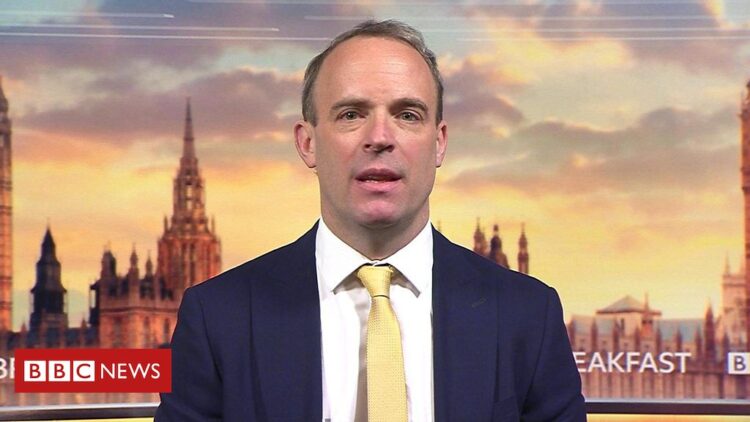By Ben Kerrigan-
The British government is “striving” to avoid “blanket” coronavirus measures, Foreign Secretary Dominic Raab has said.
Foreign Secretary Dominic Raab, told the BBC that ministers were “always ready” to introduce further restrictions, stressing the importance of continuing “targeting” the virus.
Mr. Raab’s comments come as West Yorkshire joins the third tier from next Monday, in the wake of rising infections in the region.
Under tier three rules in England, pubs and bars not serving substantial meals must shut, while household mixing is banned indoors and outdoors in private gardens, most outdoor venues and ticketed events. Further restrictions can be introduced for individual areas.
Latest figures from the Office for National Statistics, about one in 10 people in homes in England had coronavirus in the week ending 23 October – equating to about 570,000 people. This is about one third higher than the figure for the previous week – 430,000.
The ONS also estimates there was about 52,000 new infections each day in homes in England in the same week, up about half on last week’s number (35,000). The 52,000 figure is half the estimate of 100,000 a day from another study, the authors of which said the country is at a “critical stage” and “something has to change”.
Mr. Raab told BBC Radio 4’s Today programme that ministers were “confident” they had “the right measures and framework in place, which is not to have a blanket approach but to target measures […] on the areas where the uptick is highest”.
Mr. Raab said this was the most effective way to tackle the virus “and avoid the blanket approach, which I don’t think would be in the best interest of the country, and which we are striving to avoid”.
Mr Raab added that there had been “a decrease in the rate of growth” since the government had adopted that approach, although he admitted “clearly there is still an uptick in the virus”.
He said: “We’re always ready for further measures that we can take. But I think the most important thing about further measures is that we continue on the track we’re on of targeting the virus.”.
Targeted Measures
Mr Raab insisted that targeted measures were “the right thing to do”, ionstead of a full national lockdown, and appealed for “full compliance and full co-operation” in high-risk coronavirus regions to avoid more stringent measures.
On BBC Breakfast, Mr Raab insisted the public would find it “desperately unfair” for measures to be brought in across the country “while rates vary”. Mr. Raab insisted that targeted measures were “the right thing to do”, and appealed for “full compliance and full co-operation” in high-risk coronavirus regions to avoid more stringent measures.
He appealed for “full compliance and full co-operation” in high-risk coronavirus regions to avoid more stringent measures.
He said that schools and businesses had been kept open in tier three areas but the government had left in “reserve the option of taking further measures”.
Labour’s leader Sir Keir Starmer told BBC Radio 4’s Today programme he was “deeply concerned” by rising infection rates, and said “that’s why we called for a circuit-break [lockdown] over half term”.
“The prime minister didn’t choose that course and my concern is that the tier system is not strong enough to stop the infection rate going up,” Sir Keir added.
A so-called “circuit-breaker” is a short limited lockdown – of about two to three weeks. Pubs and restaurants in Northern Ireland were closed for four weeks starting on 16 October with the exception of takeaways and deliveries. Schools were closed for two weeks.

